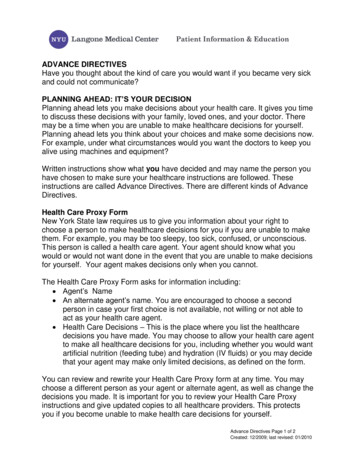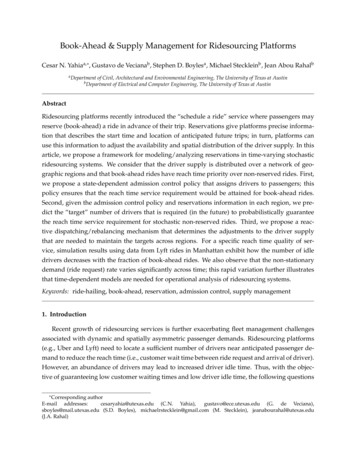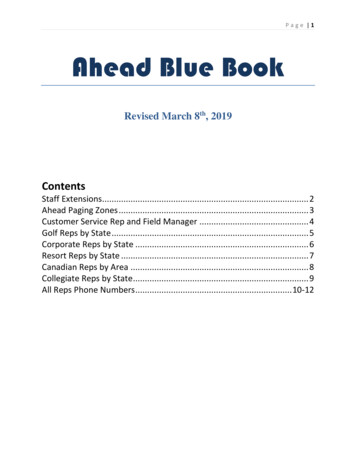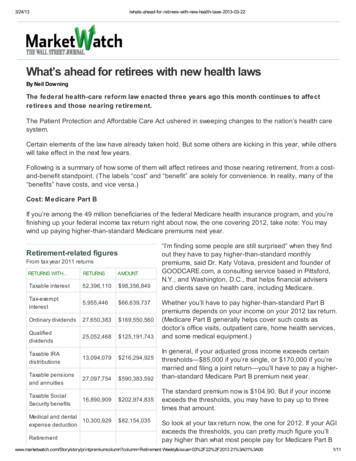
Transcription
ADVANCE DIRECTIVESHave you thought about the kind of care you would want if you became very sickand could not communicate?PLANNING AHEAD: IT’S YOUR DECISIONPlanning ahead lets you make decisions about your health care. It gives you timeto discuss these decisions with your family, loved ones, and your doctor. Theremay be a time when you are unable to make healthcare decisions for yourself.Planning ahead lets you think about your choices and make some decisions now.For example, under what circumstances would you want the doctors to keep youalive using machines and equipment?Written instructions show what you have decided and may name the person youhave chosen to make sure your healthcare instructions are followed. Theseinstructions are called Advance Directives. There are different kinds of AdvanceDirectives.Health Care Proxy FormNew York State law requires us to give you information about your right tochoose a person to make healthcare decisions for you if you are unable to makethem. For example, you may be too sleepy, too sick, confused, or unconscious.This person is called a health care agent. Your agent should know what youwould or would not want done in the event that you are unable to make decisionsfor yourself. Your agent makes decisions only when you cannot.The Health Care Proxy Form asks for information including:Agent’s NameAn alternate agent’s name. You are encouraged to choose a secondperson in case your first choice is not available, not willing or not able toact as your health care agent.Health Care Decisions – This is the place where you list the healthcaredecisions you have made. You may choose to allow your health care agentto make all healthcare decisions for you, including whether you would wantartificial nutrition (feeding tube) and hydration (IV fluids) or you may decidethat your agent may make only limited decisions, as defined on the form.You can review and rewrite your Health Care Proxy form at any time. You maychoose a different person as your agent or alternate agent, as well as change thedecisions you made. It is important for you to review your Health Care Proxyinstructions and give updated copies to all healthcare providers. This protectsyou if you become unable to make health care decisions for yourself.Advance Directives Page 1 of 2Created: 12/2009; last revised: 01/2010
Living WillYou may also choose to write a Living Will. A Living Will gives specificinstructions about the kind of care you want if you become unable to makedecisions for yourself. A Living Will does not require you to choose a health careagent. Completing both a Health Care Proxy Form and a Living Will will help tomake sure that your health care agent and your doctor know the decisions youhave made and make sure they are followed.Power of AttorneyYou may legally appoint someone to represent you in dealing with finances,billing, and expenses with a power of attorney. However, in New York, power ofattorney does not include the right to make health care decisions.If you need help filling out a Health Care Proxy form or have any questionsabout the forms, please call:At Tisch and Rusk - a Patient Advocate at (212) 263-6906At NYU Hospital for Joint Diseases – a Patient Advocate at (212) 598-6474At NYU Clinical Cancer Center – Supportive Services at (212) 731-5109or ask someone on your health care team (doctor, nurse, social worker).For more information about advance health care planning, community resources,caregiver support or to attend a workshop, please call the Social WorkDepartment at NYU Langone Tisch Hospital at (212) 263-5018 or at NYULangone Hospital for Joint Diseases at (212) 598-6030.If you have a completed Health Care Proxy form or other AdvanceDirectives (e.g., Living Will, Medical Orders for Life Sustaining Treatment“MOLST” or Do Not Resuscitate “DNR” forms) make sure to:Carry a card that lists your health care agent.Give copies of the forms to your agent and alternate agent.Tell your doctor about it and give him/her a copy of the Health Care Proxyand any other Advance Directives to keep in the medical office chart.Bring copies of the Health Care Proxy and any other Advanced Directivesany time you come to the hospital so the information can be put in yourhospital medical record.For further information about Advance Directives, you can also go to any ofthese www.nylag.org/total als/patients/health care proxy/intro.htmAdvance Directives Page 2 of 2Created: 12/2009; last revised: 01/2010
Health Care Proxy Form InstructionsItem (1)Write the name, home address and telephonenumber of the person you are selecting as youragent.Item (2)If you want to appoint an alternate agent, write thename, home address and telephone number of theperson you are selecting as your alternate agent.Item (3)Your Health Care Proxy will remain validindefinitely unless you set an expiration date orcondition for its expiration. This section is optionaland should be filled in only if you want your HealthCare Proxy to expire.Item (4)If you have special instructions for your agent, writethem here. Also, if you wish to limit your agent’sauthority in any way, you may say so here or discussthem with your health care agent. If you do notstate any limitations, your agent will be allowed tomake all health care decisions that you could havemade, including the decision to consent to or refuselife-sustaining treatment.If you want to give your agent broad authority, youmay do so right on the form. Simply write: I havediscussed my wishes with my health care agent andalternate and they know my wishes including thoseabout artificial nutrition and hydration.If you wish to make more specific instructions, youcould say:If I become terminally ill, I do/don’t want to receivethe following types of treatments.If I am in a coma or have little consciousunderstanding, with no hope of recovery, then I do/don’t want the following types of treatments:.If I have brain damage or a brain disease thatmakes me unable to recognize people or speak andthere is no hope that my condition will improve, Ido/don’t want the following types of treatments:.I have discussed with my agent my wishesabout and I want my agent to makeall decisions about these measures.Examples of medical treatments about which youmay wish to give your agent special instructionsare listed below. This is not a complete list: artificial respiration artificial nutrition and hydration(nourishment and water provided by feedingtube) cardiopulmonary resuscitation (CPR) antipsychotic medication electric shock therapy antibiotics surgical procedures dialysis transplantation blood transfusions abortion sterilizationItem (5)You must date and sign this Health Care Proxyform. If you are unable to sign yourself, you maydirect someone else to sign in your presence. Besure to include your address.Item (6)You may state wishes or instructions about organand /or tissue donation on this form. New Yorklaw does provide for certain individuals in orderof priority to consent to an organ and/or tissuedonation on your behalf: your health care agent,your decedent’s agent, your spouse , if you arenot legally separated, or your domestic partner, ason or daughter 18 years of age or older, either ofyour parents, a brother or sister 18 years of age orolder, a guardian appointed by a court prior to thedonor’s death.Item (7)Two witnesses 18 years of age or older must signthis Health Care Proxy form. The person who isappointed your agent or alternate agent cannotsign as a witness.
Health Care Proxy(1) I,hereby appoint(name, home address and telephone number)as my health care agent to make any and all health care decisions for me, except to the extent that Istate otherwise. This proxy shall take effect only when and if I become unable to make my own healthcare decisions.(2) Optional: Alternate AgentIf the person I appoint is unable, unwilling or unavailable to act as my health care agent, I herebyappoint(name, home address and telephone number)as my health care agent to make any and all health care decisions for me, except to the extent that Istate otherwise.(3) Unless I revoke it or state an expiration date or circumstances under which it will expire, this proxy shallremain in effect indefinitely. (Optional: If you want this proxy to expire, state the date or conditionshere.) This proxy shall expire (specify date or conditions):(4) Optional: I direct my health care agent to make health care decisions according to my wishes andlimitations, as he or she knows or as stated below. (If you want to limit your agent’s authority to makehealth care decisions for you or to give specific instructions, you may state your wishes or limitationshere.) I direct my health care agent to make health care decisions in accordance with the followinglimitations and/or instructions (attach additional pages as necessary):In order for your agent to make health care decisions for you about artificial nutrition and hydration(nourishment and water provided by feeding tube and intravenous line), your agent must reasonablyknow your wishes. You can either tell your agent what your wishes are or include them in this section.See instructions for sample language that you could use if you choose to include your wishes on thisform, including your wishes about artificial nutrition and hydration.
(5) Your Identification (please print)Your NameYour SignatureDateYour Address(6) Optional: Organ and/or Tissue DonationI hereby make an anatomical gift, to be effective upon my death, of:(check any that apply) Any needed organs and/or tissues The following organs and/or tissues LimitationsIf you do not state your wishes or instructions about organ and/or tissue donation on this form, it willnot be taken to mean that you do not wish to make a donation or prevent a person, who is otherwiseauthorized by law, to consent to a donation on your behalf.Your SignatureDate(7) Statement by Witnesses (Witnesses must be 18 years of age or older and cannot be the health careagent or alternate.)I declare that the person who signed this document is personally known to me and appears to be ofsound mind and acting of his or her own free will. He or she signed (or asked another to sign for him orher) this document in my presence.1430DateDateName of Witness 1(print)Name of Witness 2(print)SignatureSignatureAddressAddress7/12
Deciding AboutA G U I D E F O R PAT I E N T S A N D FA M I L I E SHealth CareNew York State Department of Health
1A G U I D E F O R PAT I E N T S A N D FA M I L I E SIntroductionWho should read this guide?T his guide is for New York State patients and for thosewho will make health care decisions for patients. Itcontains information about surrogate decision-makingin hospitals and nursing homes. It also covers DNRorders in a health care facility, or in the community.Because this guide is about health care decisionmaking, the word “patient” is used to refer to anyonereceiving medical care. This includes a nursing homeresident. This guide does not include the special rulesfor health care decisions made by legal guardians ofpersons with developmental disabilities.Can the patient or other decision maker find out about thepatient’s medical condition and proposed treatment?Y es. Patients or other decision makers have a rightto be fully informed by a doctor about their medicalcondition and the doctor’s proposed treatment. Patientsmust give informed consent before any non-emergencytreatment or procedure. Informed consent means thatafter information is given about the benefits and risksof treatment (as well as alternatives to the treatment)permission is given to go ahead with the treatment.Adult Patients Who Have the Ability toMake Informed DecisionsDo adult patients have a right to make their own health caredecisions?Y es. Adult patients have the right to make treatment1decisions for themselves as long as they have decisionmaking capacity.What is “decision-making capacity”?“ Decision-making capacity” is the ability to understandand appreciate the nature and consequences of proposedhealth care. This includes the benefits and risks of (andalternatives to) proposed health care. It also includes theability to reach an informed decision.What if it’s unclear whether or not a patient has decisionmaking capacity? Who decides whether or not the patienthas capacity? ealth care workers will assume patients haveHdecision-making capacity, unless a court has appointeda legal guardian to decide about health care. A doctorwill examine the patient if there is good reason tobelieve the patient lacks capacity. A doctor must makethe determination that a patient lacks the ability tomake health care decisions. Another person will makehealth care decisions for the patient only after thepatient’s doctor makes this determination.Do family members always make health care decisionswhenever patients lack decision-making capacity? o. Sometimes patients have already made a decisionNabout a procedure or treatment before they lose theability to decide. For example, a patient can consentto surgery that involves general anesthesia beforereceiving anesthesia, which would cause them to losethe ability to decide. Other times, a healthy personmay suddenly lose capacity. In this case, health caremay need to be given right away without consent.For example, a person may be knocked unconsciousduring an accident. Health care providers will provideemergency treatment without consent unless theyknow that a decision has already been made to refuseemergency treatment.
A G U I D E F O R PAT I E N T S A N D FA M I L I E SAdvance Directives/Health Care ProxiesWhat is an advance directive? dvance directives are written instructions about healthAcare treatment made by adult patients before they losedecision-making capacity. In New York State, the bestway to protect your treatment wishes and concerns is toappoint someone you trust to decide about treatment ifyou become unable to decide for yourself. By filling out aform called a health care proxy, this person becomes your“health care agent.” efore appointing a health care agent, make sure theBperson is willing to act as your agent. Discuss with youragent what types of treatments you would or wouldnot want if you were in the hospital and had a lifethreatening illness or injury. Make sure your healthcare agent knows your wishes about artificial nutritionand hydration (being fed though a feeding tube or IVline). You can get more information about health careproxies at: ts/health care proxy/index.htm.S ome patients also express specific instructions andchoices about medical treatments in writing. A writtenstatement can be included in a health care proxy, or it canbe in a separate document. Some people refer to this typeof advance directive as a “living will.”How do health care agents make decisions under a healthcare proxy? ealth care agents make decisions just as if the healthHcare agent were the patient. The health care agentmakes health care decisions according to the patient’swishes, including decisions to withhold or withdrawlife-sustaining treatment. If the patient’s wishes are notreasonably known, health care agents make health caredecisions in accordance with the patient’s best interests.Can a health care agent decide to withhold or withdrawartificial nutrition or hydration (through a feeding tube or anIV line)? ealth care agents can only make decisions to withholdHor withdraw artificial nutrition and hydration under thehealth care proxy if they know the patient’s wishes aboutthe treatment. But, the health care agent may also be ableto make this type of decision in a hospital or nursing homeas a surrogate from the surrogate list set forth in law.2Health Care Decision-Making in Hospitalsand Nursing HomesHow do adult patients with decision-making capacity makedecisions in hospitals and nursing homes?P atients may express decisions verbally or in writing.A hospital patient or nursing home resident may notverbally make a decision to withhold or withdrawlife-sustaining treatment unless two adults witnessthe decision. One of the adults must be a health carepractitioner at the facility. If a patient does not now havecapacity to make a decision (but made a decision in thepast about the proposed health care), the hospital ornursing home will act based on the patient’s previouslymade decision. This is true unless something occurs thatthe patient did not expect and the decision no longermakes sense.How are health care decisions made for a hospital patient ornursing home resident who does not have capacity?I f the patient has a health care proxy, the health careagent named in the proxy makes decisions. If a patientdoes not have a health care proxy, a legal guardian (orthe person highest in priority from the surrogate list,known as “the surrogate”) makes decisions.What is the surrogate list? elow is the surrogate list. The person who is highest inBpriority is listed at the top. The person with the lowestpriority is at the bottom. The spouse, if not legally separated from the patient,or the domestic partner; A son or daughter 18 or older; A parent; A brother or sister 18 or older; and A close friend.What is a “domestic partner”?A “domestic partner” is a person who: has entered into a formal domestic partnershiprecognized by a local, state or national government.Or, this person has registered as a domestic partnerwith a registry maintained by the government or anemployer; or, this person
3A G U I D E F O R PAT I E N T S A N D FA M I L I E S is covered as a domestic partner under the sameemployment benefits or health insurance; or, thisperson shares a mutual intent to be a domestic partnerwith the patient, considering all the facts andcircumstances, such as:– They live together.– They depend on each otherfor support.– They share ownership (or a lease) of their homeor other property.– They share income or expenses.– They are raising children together.– They plan on getting married or becomingformal domestic partners.– They have been together for a long time.Who cannot be a domestic partner? A parent, grandparent, child, grandchild, brother,sister, uncle, aunt, nephew or niece of the patientor the patient’s spouse. A person who is younger than 18.Who qualifies as a “close friend”? “close friend” is any person, 18 or older, who is aAfriend or relative of the patient. This person musthave maintained regular contact with the patient;be familiar with the patient’s activities, health, andreligious or moral beliefs; and present a signedstatement to that effect to the attending doctor.What if a surrogate highest in priority is not available tomake the decision?I f this happens, the next available surrogate who ishighest in priority makes the decision.What if a surrogate highest in priority is unable orunwilling to make the decision?I n this case, another person from the surrogatelist will decide. The surrogate highest in prioritymay designate any other person on the list to besurrogate, as long as no one higher in priority thanthe designated person objects.Can patients or other decision makers change their mindsafter they make a treatment decision?Y es. Decisions may be revoked after they are made bytelling staff at the hospital or nursing home.Decisions to Withhold or WithdrawLife-Sustaining Treatment in Hospitalsand Nursing HomesWhat is “life-sustaining treatment”?“ Life-sustainingtreatment” meansthat the attendingdoctor believes thepatient will die withina relatively shorttime if the patientdoes not get themedical treatmentor procedure. CPR isalways consideredto be life-sustainingtreatment.What is CPR?C PR (cardiopulmonaryresuscitation) refers to medical procedures that try torestart a p
Department at NYU Langone Tisch Hospital at (212) 263-5018 or at NYU Langone Hospital for Joint Diseases at (212) 598-6030. If you have a completed Health Care Proxy form or other Advance Directives (e.g., Living Will, Medical Orders for Life Sustaining Treatment











